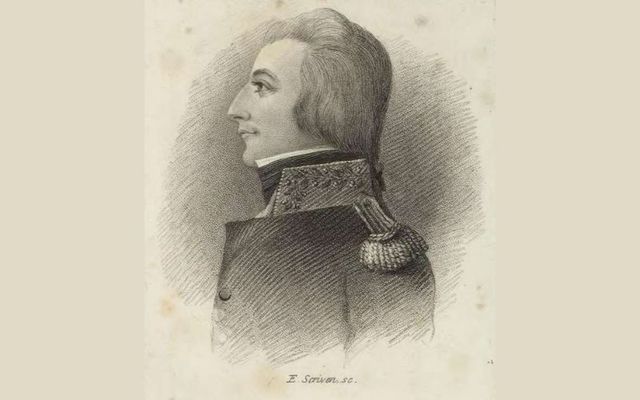Leading Irish revolutionary figure Theobald Wolfe Tone was born on June 20, 1763. Nearly 50 years after the patriot Wolfe Tone's death, his grave fell into disrepair and it was Thomas Davis, a journalist, writer and Young Irelander whose poem and song, "The Ballad of Bodenstown Churchyard," saved the green grave.
Two-hundred-and-twenty-six years ago Theobald Wolfe Tone took his own life on the 19th of November 1798 in the Royal Barracks Dublin and his body was brought back to rest in the family plot in Bodenstown Co. Kildare. In the years after the patriot's death, his grave fell into disrepair until a young man from Cork came to its rescue and in the process produced a ballad still sung to this day.
Thomas Davis was a prominent member of the Young Irelander movement and a key contributor to its mouth organ, The Nation newspaper. Born in the North Cork town of Mallow, in 1814, Davis was the son of a Welsh surgeon in the Royal Artillery. When his father died the young Davis and his mother relocated to Dublin where he studied at Trinity which molded his radical politics.
In 1843 Wolfe Tone's widow Matilda wrote a letter to The Nation asking for the grave of her dead husband to be maintained and his memory remembered. Matilda was 75 and living in Washington DC. Thomas Davis took up her plea. Along with his friend and fellow Young Irelander, John Grey paid a visit to Bodenstown to seek out the grave of Wolfe Tone.
The two Young Irelanders, Davis and Grey, were unable to find the grave in the overgrown cemetery. When they stopped by a nearby forge they met an old blacksmith who informed them he was the lone keeper of Tones' final resting place. He told Davis and Grey he had fashioned a gate around the grave and guarded it diligently but it had fallen victim to weeds and time-worn rust.
As soon as Davis got back to Dublin he set about resurrecting the memory of Wolfe Tone. Being a poet, the first thing Davis did was to pen a poem in memory of the father of Irish Republicanism. 'Tones Grave' was published on November 25th, 1843 in The Nation. The words were later put to song in what we know today as 'The Ballad of Bodenstown Churchyard.' The ballad mourns the obscurity Wolfe Tones' memory had fallen into but it helped catapult the grave in Kildare to a national status of hallowed ground.
Davis did not end his remembrance of Tone with a poem. A year later in 1844, he organized his fellow Young Irelanders to erect a proper monument at the grave and hold annual commemorations at the site.
It wasn't until the late 19th century that the grave of Wolfe Tone would become the focus of large-scale commemorations held by the Irish Republican Brotherhood. By then Thomas Davis had died at the age of just 30 from scarlet fever in 1855 while Tones' widow Matilda died in America in 1849.
Today the grave of Wolfe Tone is kept in pristine condition and 220 years after his death it remains a key place of commemoration. The poem that Thomas Davis wrote and later became a song is still a popular one to heard sung in many a ballad session across Ireland and beyond.
Here are the lyrics to Thomas Davis' song:
In Bodenstown churchyard there is a green grave,
And wildly around it the winter winds rave;
Small shelter I ween are the ruined walls there
When the storm sweeps down on the plains of Kildare.
Once I lay on that sod it lies over Wolfe Tone
And thought how he perished in prison alone,
His friends unavenged and his country unfreed
"Oh, bitter," I cried, "is the patriots meed.
"For in him the heart of a woman combined
With heroic spirit and a governing mind
A martyr for Ireland, his grave has no stone
His name seldom named, and his virtues unknown."
I was woke from my dream by the voices and tread
Of a band who came into the home of the dead;
They carried no corpse, and they carried no stone,
And they stopped when they came to the grave of Wolfe Tone.
There were students and peasants, the wise and the brave,
And an old man who knew him from cradle to grave,
And children who thought me hard-hearted, for they
On that sanctified sod were forbidden to play.
But the old man, who saw I was mourning there, said:
"We come, sir, to weep where young Wolfe Tone is laid,
And we're going to raise him a monument, too
A plain one, yet fit for the simple and true."
My heart overflowed, and I clasped his old hand,
And I blessed him, and blessed every one of his band:
"Sweet, sweet tis to find that such faith can remain
To the cause and the man so long vanquished and slain."
In Bodenstown churchyard there is a green grave,
And freely around it let winter winds rave
Far better they suit him the ruin and gloom
Till Ireland, a nation, can build him a tomb.
* Originally published in 2018, updated in Aug 2024.
This article was submitted to the IrishCentral contributors network by a member of the global Irish community. To become an IrishCentral contributor click here.




Comments